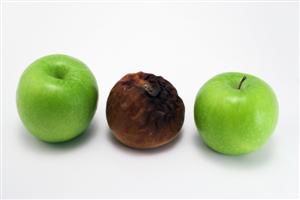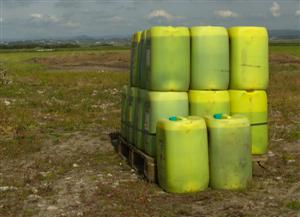Pesticides
Pesticides are used to kill and inhibit biological threats.
Biological threats are, for example, bacteria, viruses or fungal infections. These are not only threats to humans' and animals' health. In case of plants, they may severely damage the affected plant or even the entire plantation. Thus, biological threats are not only a nuisance to the farmer but can pose a threat to the population when they affect whole regions.
In many cases, these pests live on the surface of the plants. By removing the pest with disinfection techniques, the risk of a damaged plant or plantation is massively reduced.
In order to remove the threat, chemical pesticides are very often applied. These kill the viruses, fungi or bacteria. Others inhibit the reproduction mechanisms of the biological pest; still others increase the resistance of the plants to biological threats. |
|

|
| |
|
|
However, there are a number of major concerns regarding the use of pesticides:
- It is well known that pests become resistant to certain pesticides. Therefore, the dosage must be increased or combinations of pesticides must be applied. Combinations have been proven to be very successful because the combined chemicals tend to increase their effectiveness on each other.
- Since many pesticides are essentially poisons, stocks of unused pesticides pose a major environmental threat, for example in Africa or in Eastern Europe.
- According to some reports, several hundred thousand people die every year because of poisoning by pesticides. Several million people become sick.
- Pesticides have the most effect on small children, where they may affect the brain functions, the nervous system, the hormone system and fertility. Some researchers have suggested that the alarming decrease in fertility in first world countries could be related to the use of pesticides.
|
|

|
Because of these factors, the use of pesticides has been massively restricted in many countries. Restriction does not solve the problem of biological pests, though. Farmers react to the restrictions by combining small dosages of several pesticides. Unfortunately, the effects of combinations of pesticides on humans are not well understood and are in many countries not properly regulated by law; the law ignores interactions between the substances. Another option for farmers is the use of forbidden pesticides.
The ultimately best option would be, of course, a switch to biological farming methods. This option, however, takes several years of investments and hard work and is not available to many farmers.
The PhytO3 method essentially allows for massive reduction of pesticides by replacing chemical sterilization techniques with ozone water and ultraviolet light treatment. Alternatively, fruits and vegetables can be treated with the Ventafresh method in order to remove any pesticides which may still be on the surface of the plant.
More information
Note: Ventafresh and PhytO3 are patented technologies. If you're interested
in testing the products or working with them, please contact SwissFood Tech Management, Inc.
© 2006-2008 SwissFood Tech Management, Inc. · [conturia]
|


